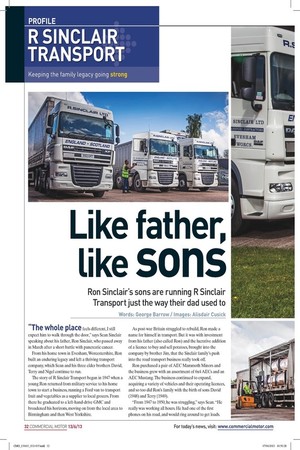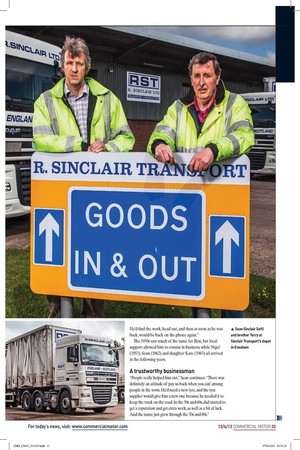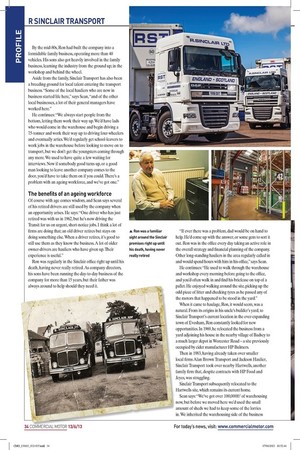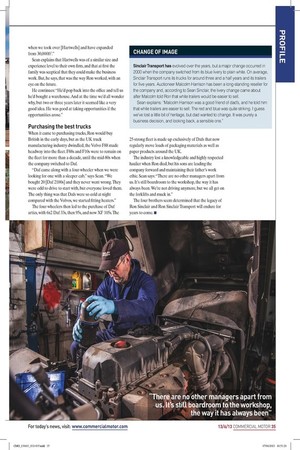Like father, Like sons Ron Sinclair's sons are running R
Page 23

Page 24

Page 25

Page 26

If you've noticed an error in this article please click here to report it so we can fix it.
Sinclair Transport just the way their dad used to Words: ueurye Dell IMageb: AUSUdli LAISiCk The whole place feels different, I still expect him to walk through the door," says Sean Sinclair speaking about his father, Ron Sinclair, who passed away in March after a short battle with pancreatic cancer.
From his home town in Evesham,Worcestershire, Ron built an enduring legacy and left a thriving transport company, which Sean and his three elder brothers David, Terry and Nigel continue to run.
The story of R Sinclair Transport began in 1947 when a young Ron returned from military service to his home town to start a business, running a Ford van to transport fruit and vegetables as a supplier to local grocers. From there he graduated to a left-hand-drive GMC and broadened his horizons, moving on from the local area to Birmingham and then West Yorkshire. As post-war Britain struggled to rebuild, Ron made a name for himself in transport. But it was with investment from his father (also called Ron) and the lucrative addition of a licence to buy and sell potatoes, brought into the company by brother Jim, that the Sinclair family's push into the road transport business really took off.
Ron purchased a pair of AEC Mammoth Minors and the business grew with an assortment of 6x4 AECs and an AEC Mustang. The business continued to expand, acquiring a variety of vehicles and their operating licences, and so too did Ron's family with the birth of sons David (1948) and Terry (1949).
"From 1947 to 1950, he was struggling," says Sean. "He really was working all hours. He had one of the first phones on his road, and would ring around to get loads. He'd find the work, head out, and then as soon as he was back, would be back on the phone again."
The 1950s saw much of the same for Ron, but local support allowed him to remain in business, while Nigel (1953), Sean (1962) and daughter Kate (1963) all arrived in the following years.
A trustworthy businessman "People really helped him out," Sean continues. "There was definitely an attitude of 'pay us back when you can' among people in the town. He'd need a new tyre, and the tyre supplier would give him a new one because he needed it to keep the truck on the road. In the 50s and 60s, dad started to get a reputation and get extra work, as well as a bit of luck. And the name just grew through the 70s and 80s." By the mid-80s, Ron had built the company into a formidable family business, operating more than 40 vehicles. His sons also got heavily involved in the family business, learning the industry from the ground up; in the workshop and behind the wheel.
Aside from the family, Sinclair Transport has also been a breeding ground for local talent entering the transport business. "Some of the local hauliers who are now in business started life here," says Sean, "and of the other local businesses, a lot of their general managers have worked here."
He continues: "We always start people from the bottom, letting them work their way up. We'd have lads who would come in the warehouse and begin driving a 7.5-tonner and work their way up to driving four-wheelers and eventually artics. We'd regularly get school-leavers to work jobs in the warehouse before looking to move on to transport, but we don't get the youngsters coming through any more. We used to have quite a few waiting for interviews. Now if somebody good turns up, or a good man looking to leave another company comes to the door, you'd have to take them on if you could. There's a problem with an ageing workforce, and we've got one."
The benefits of an ageing workforce Of course with age comes wisdom, and Sean says several of his retired drivers are still used by the company when an opportunity arises. He says: "One driver who has just retired was with us in 1962, but he's now driving the Transit for us on urgent, short-notice jobs. I think a lot of firms are doing that; an old driver retires but stays on doing something else. When a driver retires, it's good to still use them as they know the business. A lot of older owner-drivers are hauliers who have given up. Their experience is useful."
Ron was regularly in the Sinclair office right up until his death, having never really retired. As company directors, his sons have been running the day-to-day business of the company for more than 15 years, but their father was always around to help should they need it. "If ever there was a problem, dad would be on hand to help. He'd come up with the answer, or some gem to sort it out. Ron was in the office every day taking an active role in the overall strategy and financial planning of the company. Other long-standing hauliers in the area regularly called in and would spend hours with him in his office," says Sean.
He continues: "He used to walk through the warehouse and workshop every morning before going to the office, and you'd often walk in and find his briefcase on top of a pallet. He enjoyed walking around the site, picking up the odd piece of litter and checking tyres as he passed any of the motors that happened to be stood in the yard."
When it came to haulage, Ron, it would seem, was a natural. From its origins in his uncle's builder's yard, to Sinclair Transport's current location in the ever-expanding town of Evesham, Ron constantly looked for new opportunities. In 1969, he relocated the business from a yard adjoining his house in the nearby village of Badsey to a much larger depot in Worcester Road — a site previously occupied by cider manufacturer HP Bulmers.
Then in 1983, having already taken over smaller local firms Alan Brown Transport and Jackson Haulier, Sinclair Transport took over nearby Hartwells, another family firm that, despite contracts with HP Food and Jeyes, was struggling.
Sinclair Transport subsequently relocated to the Hartwells site, which remains its current home.
Sean says: "We've got over 100,000ft2 of warehousing now, but before we moved here we'd used the small amount of sheds we had to keep some of the lorries in. We inherited the warehousing side of the business when we took over [Hartwells] and have expanded from 30,000fV."
Sean explains that Hartwells was of a similar size and experience level to their own firm, and that at first the family was sceptical that they could make the business work. But, he says, that was the way Ron worked, with an eye on the future.
He continues: "He'd pop back into the office and tell us he'd bought a warehouse. And at the time we'd all wonder why, but two or three years later it seemed like a very good idea. He was good at taking opportunities if the opportunities arose."
Purchasing the best trucks When it came to purchasing trucks, Ron would buy British in the early days, but as the UK truck manufacturing industry dwindled, the Volvo F88 made headway into the fleet. F88s and Fills were to remain on the fleet for more than a decade, until the mid-80s when the company switched to Daf.
"Daf came along with a four-wheeler when we were looking for one with a sleeper cab," says Sean. "We bought 20 [Daf 2100s1 and they never went wrong. They were odd to drive to start with, but everyone loved them. The only thing was that Dafs were so cold at night compared with the Volvos, we started fitting heaters."
The four-wheelers then led to the purchase of Daf artics, with 6x2 Daf 33s, then 95s, and now XF 105s. The 25-strong fleet is made up exclusively of Dafs that now regularly move loads of packaging materials as well as paper products around the UK.
The industry lost a knowledgeable and highly respected haulier when Ron died, but his sons are leading the company forward and maintaining their father's work ethic. Sean says: "There are no other managers apart from us. It's still boardroom to the workshop, the way it has always been. We're not driving anymore, but we all get on the forklifts and muck in."
The four brothers seem determined that the legacy of Ron Sinclair and Ron Sinclair Transport will endure for years to come. • CHANGE OF IMAGE Sinclair Transport has evolved over the years, but a major change occurred in 2000 when the company switched from its blue livery to plain white. On average, Sinclair Transport runs its trucks for around three and a half years and its trailers for five years. Auctioneer Malcolm Harrison has been a long-standing reseller for the company and, according to Sean Sinclair, the livery change came about after Malcolm told Ron that white trailers would be easier to sell.
Sean explains: "Malcolm Harrison was a good friend of dad's, and he told him that white trailers are easier to sell. The red and blue was quite striking. I guess we've lost a little bit of heritage, but dad wanted to change. It was purely a business decision, and looking back, a sensible one."







































